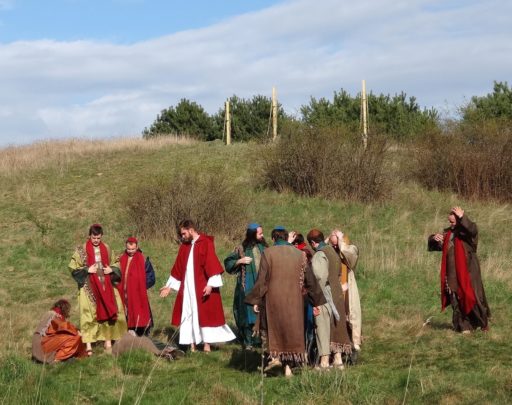I have to confess I don’t usually have any idea what the term “Catholic novel” means when people say something like “that’s a good Catholic novel.” Whenever people make such statements, I’m tempted to invoke Gandalf’s first meeting Bilbo Baggins:
What do you mean it’s a good Catholic novel? Do you mean it was written by a Catholic person? Or that it is a good novel for Catholic persons to read? Or that the novel is about Catholic persons? Or is the novel itself in some sense Catholic? Or do you mean that you are a Catholic and you think the novel is good, and so you’d like to claim this novel for your group?
Usually the answer, when I actually put this question, is a mélange of all those options but the last, and like Gandalf I’m tempted to exclaim What a lot of things you use “good Catholic novel” to mean! In actual fact, I have no interest in the first three options, and believe that most people deep down mean the last. For the most part, I’m only interested in the penultimate option: a novel that is itself in some sense Catholic.
Maybe one of the most Catholic things about Kirstin Valdez Quade’s novel The Five Wounds is the overall feeling you may have watching these characters stumbling through their lives that obtaining happiness is not the point of those lives. Loving is the point. And loving means self-sacrifice. One thing that is incredibly hard to sacrifice is the idol. An idol is…a false source of happiness. It’s interesting to me that another superb and very Catholic contemporary novel, Jon Fosse’s Septology, has for its main male character an alcoholic who has renounced alcohol. The main male character in The Five Wounds, Amadeo, is also an alcoholic who must eventually renounce alcohol.
This is one form of putting aside idolatry, and there’s a way of looking at all the Law and the Prophets as one great fight against idolatry, against the human ego and its pathetic wants and insecurities that lead it to trust in almost anything other than God. At least when I am reading literature sub specie catholice, I tend to look at substance abuse and addiction as a form of idolatry. (This is also how I view adultery.) Other characters in The Five Wounds are not able to forsake their drugs of choice, those chemical idols that (like adultery, come to think of it) are so deeply entwined with the body, and they suffer for this lack of self-discipline (askesis). For me, Catholic Christianity is above all incarnational, and that is why it is ascetic. In the traditional language of Christianity, asceticism is how one tames the passions, and the passions are bodily.
It’s no coincidence, I think, that Amadeo is a member of the local fraternity of penitentes, a charitable and ascetic—indeed, penitent—lay society unique to what was once Mexico and later became the American southwest. The penitentes are the ones who put on the annual Passion Play, in which Amadeo plays Jesus in the opening section of The Five Wounds. To be penitent, in the most basic etymological sense, means to inflict pain on oneself—this is essentially what regret is. But that pain, that regret for one’s sins, is a form of asceticism, the self-discipline that is the taking up of one’s own cross.
Closely related in the traditional Catholic imagination to the ideas of asceticism and penance is that of kenosis, the emptying out of oneself. I don’t know of a more kenotic act than giving birth. The Five Wounds is also the story of a very young woman, Angel, who finds herself pregnant in a world that does not exactly welcome the prospect of her child. As I pointed out in the previous post, this is the first part of the Gospel story, and it is set in a mountainous desert landscape like the Gospel. At the heart of the Catholic imagination there is a mother and her son; in The Five Wounds the story is centered on a father and his daughter—Amadeo and Angel. In both stories, the desperate and unforeseen bringing of a child into the world, and then safeguarding him, is the event or process around which all else revolves.
Sometimes I wonder if a Western writer can tell any story but the Christian Story (or part of it), regardless of how the writer feels about that Story. In actual practice the religion seems to me most of the time to be dead or dying fast. But in fiction—and is this not also a kind of practice, a cultural doing?—the Christian Story seems able to take on new life at every turn, even in the hands of authors who have little consciously to do with it, or are against it. Go read Karl Ove Knausgaard or Tanith Lee’s Flat Earth books, or watch The Wrath of Khan and The Search for Spock, if you don’t believe me. Perhaps this is because the Christian Story and the religion that grew up around it for a thousand or fifteen hundred years is so primordial and total—in a word, catholic.
The traditional Christian view is that this world and this life are very real and good, but that the truth which impinges most is the truth of the Fall. That is why the Incarnation happened, to begin the remedy of the Fall, and that is why we imitate Christ in penance and asceticism and kenosis, in self-sacrifice, which is to say love. The monks and scholars who kept the higher modes of human thought alive while the world went to rack and ruin around them did not have “Live, Laugh, Love” signs hanging over their desks: they had human skulls sitting upon them. Christianity is not concerned with living a good life so much as with dying a good death. It is bodily, yes—you would expect that of a religion that has for its most precious sacrament wine and bread—but it is so bodily because its telos is the resurrection, the new heaven and new earth.
No Messianic faith can finally be about the goodness and happiness of this life and this world. It need not deny these ideas on principle, but it has to tread carefully around them. Even Thoreau said when he was dying that he was leaving a very beautiful world but going to one even more beautiful. Is The Five Wounds a Catholic novel? I would say that in its structure it is: with its movement from one Lent to the next, and its introductory Passion Play followed by its messy and awkward aftermath (that’s basically the New Testament).
But in its total feeling, is it ascetic, kenotic, paradoxically world-affirming and otherworldly, world-denying? If that kind of question matters to you, then you should acquire The Five Wounds and decide for yourself.
Jonathan Geltner lives in Ann Arbor MI with his wife and two sons. His translation of Paul Claudel’s Five Great Odes is available from Angelico Press and a novel, Absolute Music, is forthcoming from Slant. He writes more about the meeting of fantasy and fiction with theology, philosophy, music and the sense of place at betweentwomaps.com





